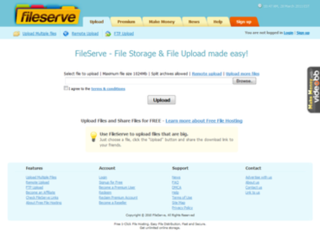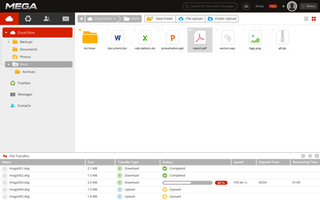Related Research Articles
A file-hosting service, also known as cloud-storage service, online file-storage provider, or cyberlocker is an internet hosting service specifically designed to host user files. These services allows users to upload files that can be accessed over the internet after providing a username and password or other authentication. Typically, file hosting services allow HTTP access, and in some cases, FTP access. Other related services include content-displaying hosting services, virtual storage, and remote backup solutions.
This is a timeline of events in the history of networked file sharing.
Megaupload Ltd was a Hong Kong–based online company established in 2005 that operated from 2005 to 2012 providing online services related to file storage and viewing.

Microsoft OneDrive is a file hosting service operated by Microsoft. First launched in August 2007, it enables registered users to share and synchronize their files. OneDrive also works as the storage backend of the web version of Microsoft Office. OneDrive offers 5 GB of storage space free of charge, with 100 GB, 1 TB, and 6 TB storage options available either separately or with Microsoft 365 subscriptions.
RapidShare was an online file hosting service that opened in 2002. In 2009, it was among the Internet's 20 most visited websites and claimed to have 10 petabytes of files uploaded by users with the ability to handle up to three million users simultaneously. Following the takedown of similar service Megaupload in 2012, RapidShare changed its business model to deter the use of its services for distribution of files to large numbers of anonymous users and to focus on personal subscription-only cloud-based file storage. Its popularity fell sharply as a result and, by the end of March 2015, RapidShare ceased to operate and it is defunct. As of 2017, Rapidshare AG was acquired by Kingsley Global.

The Digital Millennium Copyright Act (DMCA) is a 1998 United States copyright law that implements two 1996 treaties of the World Intellectual Property Organization (WIPO). It criminalizes production and dissemination of technology, devices, or services intended to circumvent measures that control access to copyrighted works. It also criminalizes the act of circumventing an access control, whether or not there is actual infringement of copyright itself. In addition, the DMCA heightens the penalties for copyright infringement on the Internet. Passed on October 12, 1998, by a unanimous vote in the United States Senate and signed into law by President Bill Clinton on October 28, 1998, the DMCA amended Title 17 of the United States Code to extend the reach of copyright, while limiting the liability of the providers of online services for copyright infringement by their users.
Grooveshark was a web-based music streaming service owned and operated by Escape Media Group in the United States. Users could upload digital audio files, which could then be streamed and organized in playlists. The Grooveshark website had a search engine, music streaming features, and a music recommendation system.

IO Group, Inc. v. Veoh Networks, Inc., 586 F. Supp. 2d 1132, is an American legal case involving an internet television network named Veoh that allowed users of its site to view streaming media of various adult entertainment producer IO Group's films. The United States District Court for the Northern District of California ruled that Veoh qualified for the safe harbors provided by the Digital Millennium Copyright Act (DMCA), 17 U.S.C. § 512 (2006). According to commentators, this case could foreshadow the resolution of Viacom v. YouTube.

Docs.com was a website where users could discover, upload and share Office documents. Supported file types included Word documents, Excel spreadsheets, PowerPoint presentations, Mix video presentations and Sways. Users could also add PDFs and URLs on to their page. Docs.com was a part of Microsoft Office Online.

Hotfile was a one-click file hosting website founded by Hotfile Corp in 2006 in Panama City, Panama. On December 4, 2013, Hotfile ceased all operations, the same day as signing a $4 million settlement with the Motion Picture Association of America (MPAA); the settlement had previously been misreported as $80 million.

Capitol Records, Inc. v. MP3tunes, LLC is a 2011 case from the United States District Court for the Southern District of New York concerning copyright infringement and the Digital Millennium Copyright Act (DMCA). In the case, EMI Music Group and fourteen other record companies claimed copyright infringement against MP3tunes, which provides online music storage lockers, and MP3tunes's founder, Michael Robertson. In a decision that has ramifications for the future of online locker services, the court held that MP3tunes qualifies for safe harbor protection under the DMCA. However, the court found MP3tunes to still be liable for contributory copyright infringement in this case due to its failure to remove infringing songs after receiving takedown notices. The court also held that Robertson is liable for songs he personally copied from unauthorized websites.
Google Drive is a file storage and synchronization service developed by Google. Launched on April 24, 2012, Google Drive allows users to store files in the cloud, synchronize files across devices, and share files. In addition to a web interface, Google Drive offers apps with offline capabilities for Windows and macOS computers, and Android and iOS smartphones and tablets. Google Drive encompasses Google Docs, Google Sheets, and Google Slides, which are a part of the Google Docs Editors office suite that permits collaborative editing of documents, spreadsheets, presentations, drawings, forms, and more. Files created and edited through the Google Docs suite are saved in Google Drive.

FileServe was an online internet file hosting service.

The seizure of Megaupload, a popular filesharing website with 150 million registered users, occurred on January 19, 2012, following a US indictment accusing Megaupload of harbouring millions of copyrighted files. According to the indictment, Megaupload was costing copyright holders over $500 million in lost revenues.
This is a comparison of online music storage services, Internet services that allow uploads of personally owned or licensed music to the cloud for listening on multiple devices.

Multiple criminal indictments and enforcement actions were taken against Megaupload owner Kim Dotcom in various jurisdictions. On 19 January 2012 the United States Department of Justice seized and shut down the file-hosting site Megaupload.com and commenced criminal cases against its owners and others. On 20 January 2012 Hong Kong Customs froze more than 300 million Hong Kong dollars in assets belonging to the company.

MEGA is a cloud storage and file hosting service offered by MEGA Limited, a company based in Auckland, New Zealand. The service is offered through web-based apps. MEGA mobile apps are also available for Android and iOS.
Ira P. Rothken is an American high technology attorney and computer scientist who has handled numerous cases of first impression involving the internet and new technologies.

Putlocker is a file hosting index website used for streaming entertainment media, particularly films and television series, for free. The initial website originated in the United Kingdom in 2011, and grew to receive millions of daily visitors after the shutdown of Megaupload. In May 2016, the website was blocked in the UK by a High Court order, and at its peak prior to a temporary closure in late 2016, Alexa Internet listed Putlocker as ranking among the top 250 most-visited websites worldwide. Putlocker has been reported by the Motion Picture Association (MPA) as a major piracy threat.
Zippyshare, also capitalized ZippyShare, was a free file-sharing website.
References
- 1 2 3 "FileSonic cyberlocker offline after piracy complaints". BBC News. BBC. January 22, 2012. Retrieved 17 July 2016.
- ↑ Brodkin, Jon (Jan 19, 2012). "Before shutdown, Megaupload ate up more corporate bandwidth than Dropbox". Ars Technica. Condé Nast. Retrieved 17 July 2016.
Another consumer-oriented service accounting for a chunk of traffic was Filesonic, which appeared on 52 percent of networks
- ↑ Paul, Ryan (Jan 22, 2012). "FileSonic has disabled file sharing in wake of Megaupload takedown". Ars Technica. Conde Nast. Retrieved 17 July 2016.
FileSonic uses digital fingerprinting technology from a content identification firm called Vobile to detect copyrighted material... The company has a designated DMCA agent and provides instructions for submitting a claim.
- ↑ Musil, Steven (January 22, 2012). "FileSonic disables file sharing in wake of MegaUpload arrests". CNET. CBS Interactive. Retrieved 17 July 2016.
The service can "only be used to upload and retrieve files you have uploaded personally," according to a note posted on the site's home page. FileSonic also suspended its affiliates rewards program, which paid users when people downloaded their files.
- ↑ Whittaker, Zack (January 22, 2012). "FileSonic shutters: Another file-sharing site bites the dust". ZDnet. CBS Interactive. Retrieved 17 July 2016.
File-sharing site FileSonic has announced that it has disabled "all sharing functionality", and that its service can "only be used to upload and retrieve files you have uploaded personally".
- ↑ Whittaker, Zack (September 3, 2012). "FileSonic goes offline". CNET. CBS. Retrieved 17 July 2016.
Popular digital locker service FileSonic has gone offline. The file-sharing site went dark on Wednesday and has been unreachable since